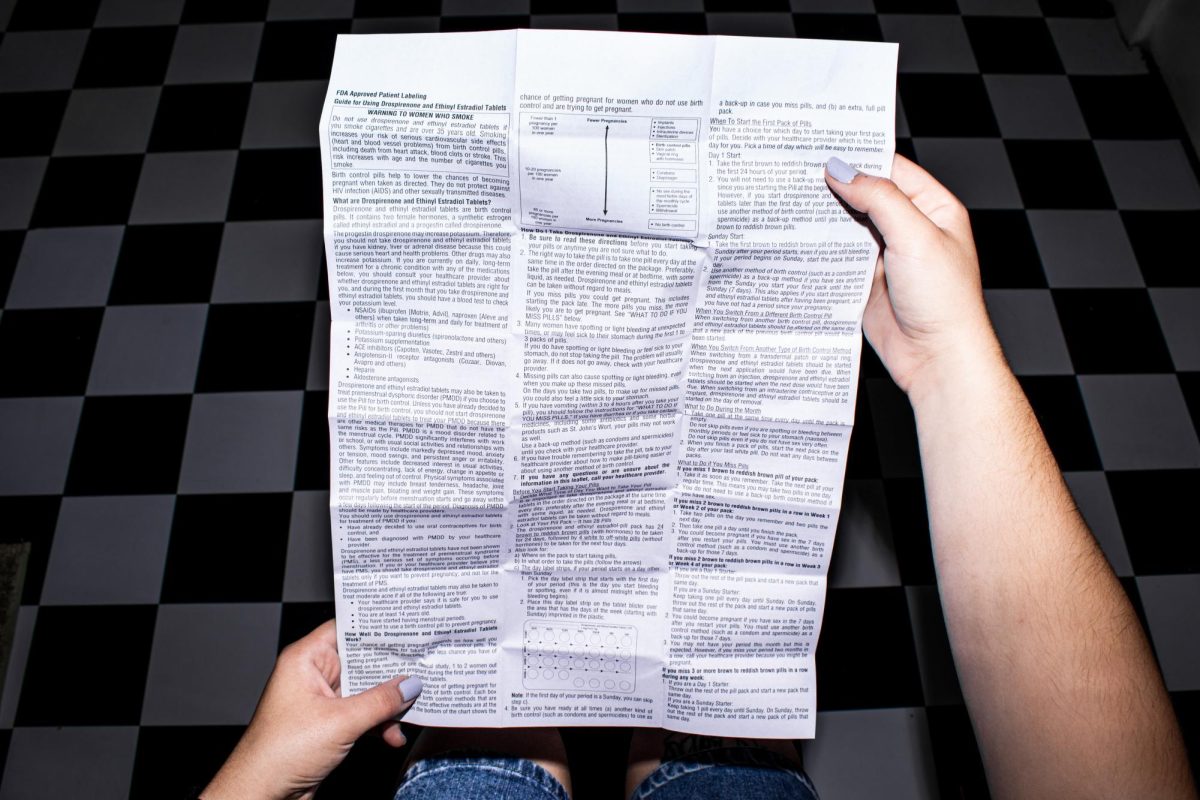After starting hormonal birth control, I had no idea the extent of sadness I was bound to experience.
My day-to-day lifestyle changed drastically. Any task, no matter how simple, feels too heavy of a burden and my desire to put energy into anything is lost. I consistently spiral out about surface-level problems and immediately feel weak for doing so.
It only gets worse when my period comes every month.
I constantly miss out on events or purposefully exclude myself from talking to people fearful that I would only bring the energy down. I can’t even pretend to be happy or enthusiastic. I’m mentally exhausted all the time.
At this point, I had to question what was wrong with me and if I was the problem to begin with.
I began birth control after my doctor told me it would help regulate the pain that came from my periods. After being on the pill for eight months and feeling so incredibly low, I realized the mental pain I was experiencing was just as bad as — if not worse than — the physical pain I experienced before.
I figured I could either get off hormonal birth control completely and deal with the monthly physical pain or stay on the pill and deal with the mental turmoil that overtook me every day.
Either way, I would be hurting.
More than half of people who are on the pill, or even other forms of hormonal birth control rely on it for matters other than pregnancy prevention. It’s used to regulate the menstrual cycle, reduce acne, alleviate endometriosis, relieve period pain and much more. This is the case for a majority of women in my life who are on birth control.
However, when the extent of the symptoms that come from being on birth control begin to surpass its initial purpose, is staying on it even worth it anymore?
Ella Shaw, a third-year student at the University of Minnesota, started the pill at 14 to help with acne after it was suggested by her doctor. Over the next few years, Shaw switched to many other forms of hormonal contraception including the arm implant, the monthly shot and the copper IUD.
“With all forms of birth control that I tried, it was horrible for my mood, for my mental health,” Shaw said. “I was not in touch with my natural cycle at all, and since we’re so hormonal as teenagers anyway, I truly believe that it created more problems for my mood, to a point where it wasn’t even worth it to help out the acne.”
Shaw said she also experienced an imbalanced menstrual cycle, noting the arm implant caused her to not have a period for months to then having her period almost every day.
“They don’t really fully explain to you how your mood can be impacted by these things,” Shaw said. “So when that happens, someone’s first thought might not be, ‘Oh, maybe this is my hormones.’ Instead, we think to ourselves, ‘What is wrong with me? Something’s really wrong with me,’ and that can be super scary.”
According to a study, up to 90% of women experience some level of period pain. This can range from noticing pain, yet not affecting your daily activities, to severe pain to which you cannot focus on anything else. I found myself going through the latter every month.
It felt like the only way to feel better was to pump my body with pain relievers and try every remedy out there just to get through the day. I considered it a win if I was able to attend just half of a day of school.
Lynniah Weddington, a third-year student at the University, said she began the pill at age 13 after dealing with painful, heavy and irregular periods, and has been on it ever since.
“When I first started, my hormones were so irregular, and now I got to the point where I balanced out,” Weddington said. “I actually just started on a lower hormone birth control because the hormone I was just on was probably too high and I started to miss periods.”
For Weddington, the pill has significantly reduced cramps and regulated her cycle. She said switching to a lower hormonal dosage helped with the hormonal acne caused by her periods. However, Weddington does question whether her mood swings at the time were due to birth control or simply being a teenager in middle school.
Madison Banken, a second-year student, began the pill at age 14 to also control painful and irregular periods, as well as reduce acne but switched to the monthly shot after feeling emotional and experiencing consistent headaches.
“I did depo (shot) for six months, and then I stopped that because that was just awful,” Banken said. “It made me insanely moody, and it didn’t regulate my period. It actually made it worse. And then I did patches for about four months after that, and then I’ve had the IUD since.”
For me, being on the pill has made navigating my period pain so much easier. I can actually function with the rest of society.
Kelsey Felling, a third-year student, said she went to the doctor in the hope of treating her irregularly long cycles, causing her to develop anxiety about it but was upset when the only advice they offered her was to go on the pill.
“If I go to the doctor and say, ‘Hey, I think something’s wrong,’ shouldn’t they trust me and go in and see if there’s something wrong?” Felling said.
After being on the pill for a couple of months, Felling said she began to experience severe back pain to the point where she could not get out of bed and generally did not feel like herself.
“It felt like I was in a shell of myself, and like I was just like an emotionless being,” Felling said. “Numb. It felt numb. The emotions affected my relationships because my friends were like, ‘What’s wrong with you?’ And I was like, ‘I don’t know.’”
It feels like the easiest and quickest way for most doctors to help women with physical pain is to immediately prescribe birth control.
This method is downright lucrative and short-sighted.
When will those in medicine come up with long-term solutions to the physical pain the female body seems to constantly endure, instead of the quick fix that is birth control? When will there be more emphasis on women’s health?
I am tired of being in physical pain all of the time. And if not physical, then mental.
Nevertheless, that is not to say birth control should be completely ruled out.
Gabriela Oconitrillo, a first-year student, has been on the pill for about a year now and said she wished she started it sooner to help with her period pain.
“I would always hear a lot of negative things about birth control,” Oconitrillo said. “I had always wanted to go on it for my period symptoms, but on the internet, I heard a lot of negative stuff about how it didn’t help, or it made you gain a lot of weight or just a lot of negative things about it that made me scared to go on it that I haven’t experienced while taking it.”
Don’t get me wrong, birth control has definitely helped me in many ways. While I do have really bad days, I do my best to push through. Since realizing my sadness, I’ve spoken to my doctor about going on a lower dosage — something I did not know was possible prior.
Every woman I spoke to for this article mentioned how important it is to do research on the symptoms of hormonal birth control, as well as the different forms that are offered.
Birth control is not a “one size fits all” situation. One form may work wonders for one person but be a living hell for another. Trying out different dosages of hormones as well as different methods is a very normal process in finding the right one for you.
Discussion on these symptoms should not feel taboo to the public. The importance of speaking openly about birth control, as well as women’s health, can offer incredible insight to many who may not have been educated on it.




















susan
Sep 13, 2024 at 11:33 am
I wish you would do a follow up story on the fact they have had an effective male based BC pill for well over a decade, which does not cause as much hormonal interference for men. It has been researched and found to be safe and effective with fewer side effects. The last time I studied up, though effective, big Pharma will not market it because they feel there is no market for the drug since men will not take it. Could a writer do some research on this and find out what the status of male focused bc medications is currently?
Claire Hilgeman
Sep 13, 2024 at 11:19 am
Unfortunately, the medical community at large is sorely lacking in empathy for women’s menses issues. Male doctors have no clue and don’t want to and female doctors treat you like you’re weak and whiney for making a big deal out of a “natural” condition. Women have been using homeopathic remedies for thousands of years- we should study this option more.